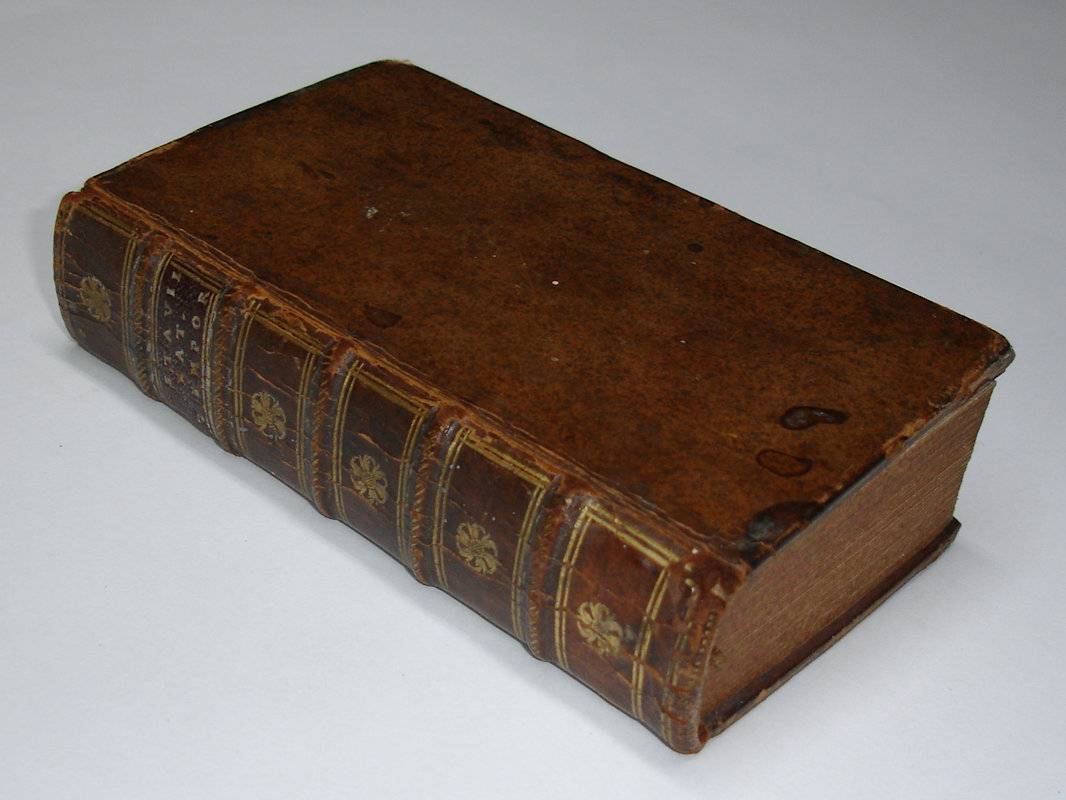PETAVIUS,D.
D. Petavii Aurelianensis e Societate Iesu Rationarium Temporum in partes duas, libros tredecim distributum. In quo aetatum omnium sacra profanaque historia chronologicis probationibus munita summatim traditur. Editio ultima, nonnullis accessionibus auctior facta, & ab Auctore recognita.
Paris (Parisiis), Apud Sebastianum Cramoisy, Regis & Reginae Architypographum, 1662 - 1663.
12mo. 2 volumes in 1: (XX),526 (recte 516),(76 index),(2 blank); 241,(7 index),(2 blank) p. Calf. 15 cm (
Details: Back gilt, and with 5 raised bands; red morocco letterpiece in the second compartment. Marbled enpapers) (
Condition: Binding worn at the extremities. Corners bumped. Owner's entry on the title. Small label on the front pastedown partly removed) (
Note: This 'Rationarium Temporum' of the French Jesuit classical scholar, historian and theologian Denis Pétau, latinized as Dionysius Petavius, 1583-1652, is a summary, made for a greater public and for the use at schools, of his great work on chronology 'De Doctrina Temporum', which he published in 1627. The summarized version 'Rationarium Temporum' first appeared in 1633, and was reissued/revised/augmented many times. It was also translated into French, English and Italian. In KVK we counted till 1745 22 Latin editions, of which 8 were published by Cramoisy in Paris between 1633 and 1673. Petavius devoted a large part of this 'Doctrina Temporum' to the vehement criticism of 'De Emendatione Temporum' of the great protestant French scholar J.J. Scaliger, 1540-1609, who is considered to be the first serious modern student of chronology. The Jesuits however considered Scaliger, who lost no opportunity to attack them, an heretic and a great danger to the catholic church. Their opinion on his 'De Emendatione Temporum' (1593) was that it was worthless (frivolum) and a pack of lies (commentitum). Especially Scaliger's denial of the authenticity of the works of Dionysius Areopagita raised their anger. The Jesuits believed that Scaliger undermined the authority of the church, for in the work of Dionysius Areopagita the Jesuits found proof of the 'transsubstantiation', the belief that the substance of the bread and wine used in the sacrament in the Eucharist changed into that of the body and blood of Christ. (J. Bernays, 'Joseph Justus Scaliger', Berlin 1855, p. 81) Dionysius Petavius, a member of the Jesuits, an order called colloquially 'God's Soldiers', took up the fight against Scaliger with the publication of his 'Doctrina Temporum' of 1627. Petavius was a brilliant scholar, and he succeeded in correcting and improving the chronological labours of Scaliger on many points, even though his criticism directed against the protestant scholar was unfair and mean. The science of locating historical events in the ancient world in time is ultimately based on the work of Scaliger and Petavius) (
Provenance: Name on the title of 'Hebert Le Jeune, 1720', lightly crossed out. The remains of the small bookplate on the front pastedown are of a Jesuit library) (
Collation: a8, e2; A-2A12, 2B8, 2C2 (leaf 2C2 blank); A-K8, L2, M2 (2M2 blank) (Photographs on request)
Book number: 120290 Euro 320.00
Keywords: (Oude Druk), (Rare Books), Chronologie, French imprints, Jesuits, alte Geschichte, ancient history, antike altertum antiquity, chronology
 PETAVIUS,D.
PETAVIUS,D.